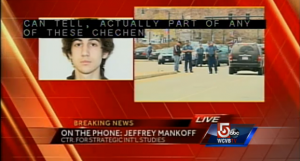 Like many, I have been closely monitoring the news about the Boston Marathon bombing and the ensuing manhunt. As I write this, one of the two bomb brothers has been killed and the other is on the run somewhere in or near Watertown, MA just outside Boston. People in the area are hunkered down, public transit is shut down and fear is running rampant.
Like many, I have been closely monitoring the news about the Boston Marathon bombing and the ensuing manhunt. As I write this, one of the two bomb brothers has been killed and the other is on the run somewhere in or near Watertown, MA just outside Boston. People in the area are hunkered down, public transit is shut down and fear is running rampant.
Not sure I want to say what I am about to say because I know many if not most people will misunderstand me and perhaps be angry with me. A few of my comments on Face Book have already received some adverse reactions. Perhaps it is because people are understandably upset and very emotional right now. I acknowledge them and their feelings. I grew up in Boston and have friends and family. When I heard of the bombing, I made several urgent calls to my children, friends and other family members to check on their safety. So I really do understand.
We have a choice here. We can allow our emotions of fear, anger and revenge to run the show or we can do something different, something that could break the cycle of violence. The emotions that many of us feel about these horrendous events and the people who committed them are no doubt similar to the feelings the bombers may have had. Certainly, no one could commit such acts without hate and fear filling their hearts and minds. These emotions give rise to a sense of separation and suspicion of others and allow us to see others as separate from us. I don’t know for sure how these brothers actually felt, but I do know they are human beings.
Can we forgive them? What would happen if we did? I don’t know for sure because we have never done such a thing on a mass basis. One thing we do know is that following the same old revenge and punishment model doesn’t work. We have imprisoned and executed people for centuries yet horrible crimes like this continue to take place. If anything, these events have increased in frequency and severity. Are we willing to consider another approach?
The initial reaction from most to my suggestion will likely be condemnation and disdain. Anger may be directed at me as well. But that is my point. If even a suggestion from someone like me who has no connection to the crime elicits consternation and upset from people, do we need any further proof that another path is needed? Does more anger and suffering solve anything? No. But worse, this anger and desire for punishment and suffering is the very thing that insures that these emotions will continue to rule our collective behavior.
Are you willing to consider forgiveness? Do you think it would be possible to see the benefit of forgiveness and separate it from judgments about right and wrong? Yes, it is possible to forgive yet not condone. Do we want to not only continue but actually support the negative emotional cycle that fuels violence and suffering around the world? How does punishing people that we condemn in fear and anger end violent acts that are fueled by these same thoughts and emotions? Clearly, it doesn’t. This horrendous event and many others demonstrate that.
Forgiveness is just about the only thing we haven’t tried. Forgiving is not easy. It runs counter to the fear and punishment model that most of us have been raised with. Can we collectively turn the other cheek? Are we willing to try something new that may actually help to end the cycle of violence and suffering? Or do we want to keep fueling the cycle with our own anger and thirst for revenge and punishment? It is up to us. This is not about right or wrong. It is about bringing an end these senseless acts. It starts with you and me.